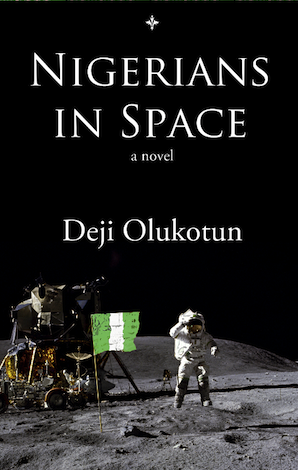 Wale had already decided what he would do when he landed on the moon.
Wale had already decided what he would do when he landed on the moon.
“He wouldn’t hit golf balls like the American astronauts” did. Instead, he would play the talking drum, “squeezing out” its rhythms “into the blackness between the stars.”
“He would bind the stars with the drums. There would be dancing.”
Wale’s dream of heading a Nigerian lunar program is the heart of Deji Olukotun‘s debut novel, Nigerians in Space (2014, Unnamed Press). Wale is a brilliant lunar geologist. For some reason, his rise through NASA’s bureaucratic hierarchy is stuck at a mid-level research position. This bureaucratic injustice has left him a jaded and bitter man.
But here is Mr. Nurudeen Bello—the mysterious mastermind of the Nigerian lunar mission called Project Brain Gain—offering him the chance to walk on the moon.
He has never met Mr. Bello in person. He knows Bello only through hushed conversations on pay phones. Mr. Bello was a man who existed only in the sound of his voice and the strange power of his words to charm his listeners.
Despite his strong misgivings about the whole enterprise, Wale steals a piece of moon rock from his lab in NASA, as instructed by Bello, and skips town, taking his wife Tinuke and their little son, Dayo. The plan is that he will meet Bello in Washington DC and officially begin the heroic odyssey to space.
What Wale cannot foresee, however, is that he is about to feature in a classic noir fiction. He will not meet Bello and what follows will be a sky-high pile up of disasters taking place at break-neck speed.
Nigerians in Space is so much a novel of our time that it helps us track how far we’ve come from mid-century African novels. We’ve come a long way from novels like Things Fall Apart, novels that presents life as it takes place in a single locality.
Olukotun’s novel is set in Houston, Stockholm, Basel, Paris, Abuja, Bulawayo, Lagos, Capetown, Johannesburg, and Paris. These days, African novels are built on the life of the global African nomad.
From Teju Cole’s Julius to Chris Abani’s Sunil, contemporary African fiction is defined by characters for whom mobility is life. They traverse global spaces and force us to think of Lagos and Abuja in the context of Basel and Bulawayo.
Some novels hand the reader one unbroken spool of narrative thread to unravel. The thread may twist and turn as the plot requires, but it is never broken. Nigerians in Space holds the reader’s attention, somewhat counterintuitively, through the stupefying incoherence of the plot.
When Wale’s meeting with Bello fails, his increasing paranoia and desperate attempt to unravel the mystery around Bello and the botched space mission take him through a dizzying array of spaces—from Houston to Stockholm, to Basel, to Cape Town. The first chapter ends, and the reader, who is as confused and breathless as Wale is, turns the page hoping to take comfort in some explanation or a plot movement that takes the story forward.
Instead the reader is transported 21 years to the present day with a sentence that reads: “Thursday Malaysius had worked at Abalone Silver for two years.” No explanation how Thursday is tied to Wale, Bello, or Project Brain Gain. But then no sooner you fall in love with Thursday, you’re introduced to Melissa, and Mrs. Niyangabo, and so on.
These sharp, unpredictable turns in a plot moving at lightening speed is exhilarating and will leave you delightfully lightheaded. I let myself free fall down this zigzagging tunnel of stories. I suggest you do the same. It’s a literary trip of sheer delight. The fragmented portraits and incidents do come together in a stunning collage.
Pub. Date: January 19, 2014.
Unnamed Press. 296 pp.
Download HERE.
***
About the Author:
 DEJI BRYCE OLUKOTUN is the Freedom to Write Fellow at PEN American Center. His novel Nigerians in Space, an international thriller about brain drain, was published by Unnamed Press in February. He studied fiction at the University of Cape Town in South Africa and his work has been published in Guernica, World Literature Today, and ESPN. @dejiridoo
DEJI BRYCE OLUKOTUN is the Freedom to Write Fellow at PEN American Center. His novel Nigerians in Space, an international thriller about brain drain, was published by Unnamed Press in February. He studied fiction at the University of Cape Town in South Africa and his work has been published in Guernica, World Literature Today, and ESPN. @dejiridoo









Eche December 21, 2014 15:27
Please where can i find this book in lagos, Nigeria.